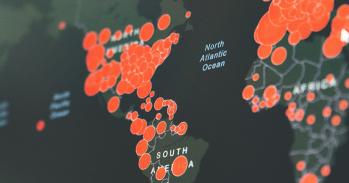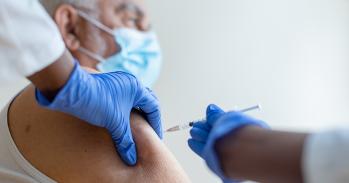
Emma Glennon is a PhD candidate in the Department of Veterinary Medicine and a Gates Cambridge Scholar. Here, she tells us about her research on infectious disease and how they emerge, the importance of interdisciplinary work, and learning how to catch bats.
Emma Glennon is a PhD candidate in the Department of Veterinary Medicine and a Gates Cambridge Scholar. Here, she tells us about her research on infectious disease and how they emerge, the importance of interdisciplinary work, and learning how to catch bats.
I try to understand how and why new diseases emerge. As cities grow and climates change, new and poorly-understood diseases are causing outbreaks more and more frequently. I build models to help understand how this happens, from how zoonotic diseases – that is, diseases that ‘jump’ from animals to people – circulate in wildlife to how we can detect rare viruses once they make that jump into people. This work is sometimes theoretical but sometimes directly applicable to public health; next month I expect to be deployed to the Democratic Republic of the Congo to work as an epidemiologist on the Ebola outbreak response.
I do primarily computational work, so most days I code and run simulations and write. However, to get to know more of my (very interdisciplinary) team and understand the data I use, I also went to Australia for fieldwork last year. While there, my work looked completely different: I caught bats, collected samples, and climbed a few trees to try to find out what they were eating. Catching bats requires such obscure skills as stringing up flag poles, detangling claws from nets, writing labels in the dark, and feeling vibrations through strings from impacts 20 meters away. I also had a few too many close encounters with spiders the size of my fist.
My hope is that eventually we will understand how to better prevent, detect, and stop outbreaks. Once these sorts of diseases start spreading among people--as we’ve seen in recent years with Ebola--outbreaks can get out of control quickly. Prevention can take a number of forms, including changing how we interact with our environments to protect the health of wildlife and developing health capacity to make sure we notice an outbreak as soon as it starts.
One of my favourite parts of doing a PhD here has been the freedom to do pursue truly interdisciplinary and international work. I’ve learned about my own field in a deep way, but I’ve also been able to learn from collaborators in ecology, virology, computer science, and anthropology, and I think my work is much better for it.
Be stubborn and support other women. There are real frustrations with being a woman in STEM, but in my experience it's easier to get through them if you stand up for what you're passionate about, what you're good at, and where you want to go. And if you are successful, please support other women trying to do the same! Being part of supportive circles of women and LGBTQ+ scientists has been invaluable to me, and I hope one day I get to help make the road a little smoother for others.

The text in this work is licensed under a Creative Commons Attribution 4.0 International License. Images, including our videos, are Copyright ©University of Cambridge and licensors/contributors as identified. All rights reserved. We make our image and video content available in a number of ways – as here, on our main website under its Terms and conditions, and on a range of channels including social media that permit your use and sharing of our content under their respective Terms.




